Sustainability Management: A Case Study of Tesco
VerifiedAdded on 2023/06/16
|6
|1441
|221
AI Summary
This report discusses the concept of sustainability management and its importance in the corporate sector. It focuses on Tesco as a case study and recommends sustainable initiatives that the company can adopt. The potential benefits of these initiatives are also discussed.
Contribute Materials
Your contribution can guide someone’s learning journey. Share your
documents today.

MANAGEMENT
Secure Best Marks with AI Grader
Need help grading? Try our AI Grader for instant feedback on your assignments.
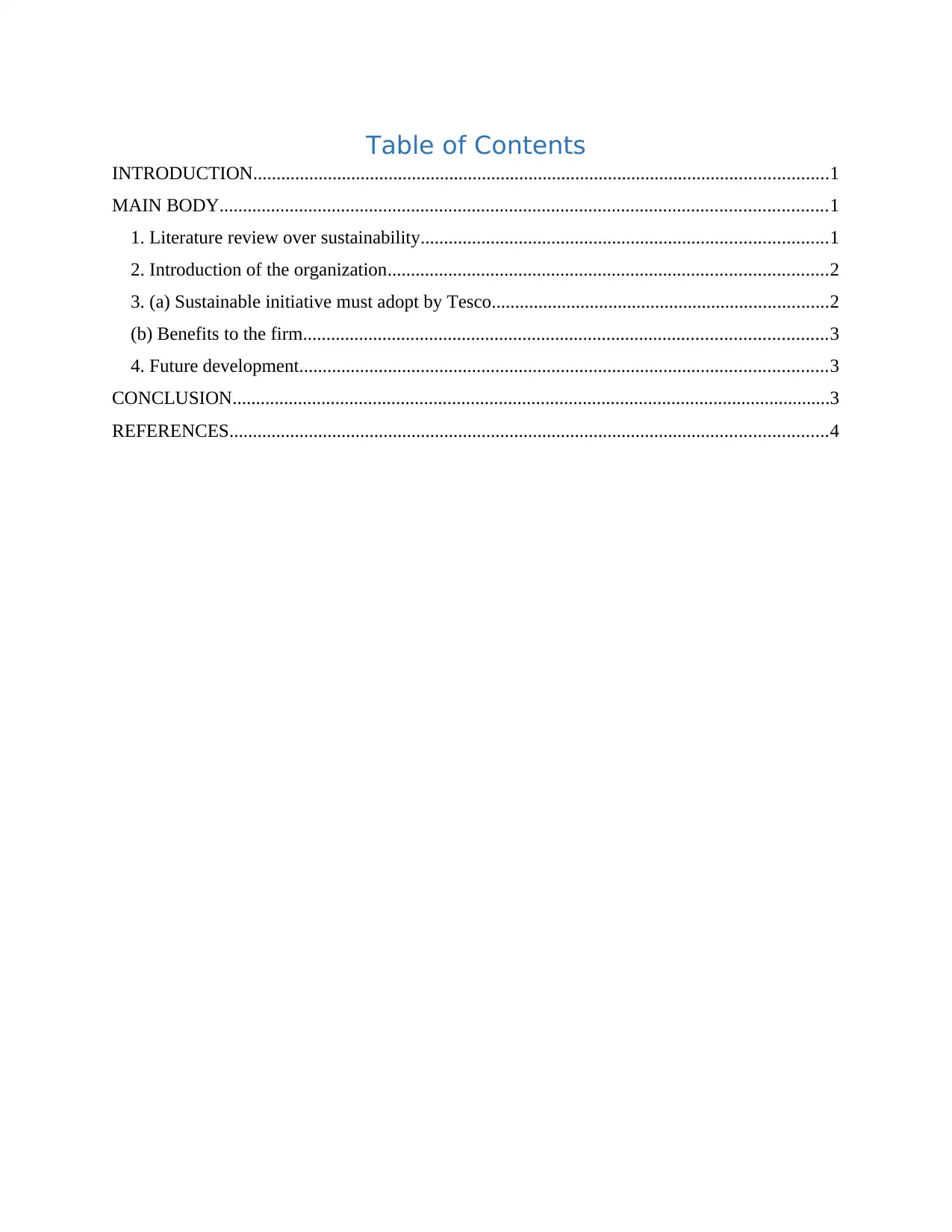
Table of Contents
INTRODUCTION...........................................................................................................................1
MAIN BODY..................................................................................................................................1
1. Literature review over sustainability.......................................................................................1
2. Introduction of the organization..............................................................................................2
3. (a) Sustainable initiative must adopt by Tesco........................................................................2
(b) Benefits to the firm................................................................................................................3
4. Future development.................................................................................................................3
CONCLUSION................................................................................................................................3
REFERENCES................................................................................................................................4
INTRODUCTION...........................................................................................................................1
MAIN BODY..................................................................................................................................1
1. Literature review over sustainability.......................................................................................1
2. Introduction of the organization..............................................................................................2
3. (a) Sustainable initiative must adopt by Tesco........................................................................2
(b) Benefits to the firm................................................................................................................3
4. Future development.................................................................................................................3
CONCLUSION................................................................................................................................3
REFERENCES................................................................................................................................4
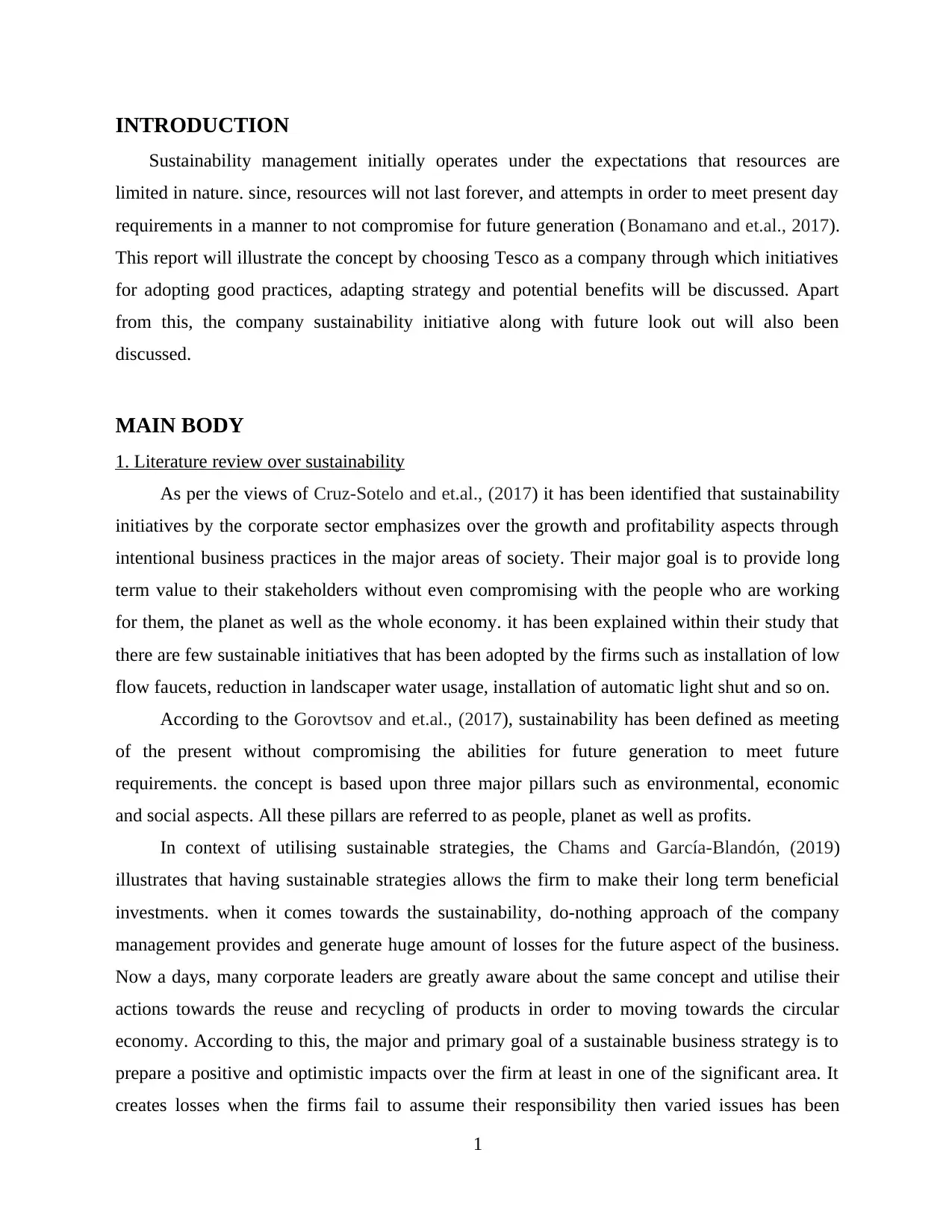
INTRODUCTION
Sustainability management initially operates under the expectations that resources are
limited in nature. since, resources will not last forever, and attempts in order to meet present day
requirements in a manner to not compromise for future generation (Bonamano and et.al., 2017).
This report will illustrate the concept by choosing Tesco as a company through which initiatives
for adopting good practices, adapting strategy and potential benefits will be discussed. Apart
from this, the company sustainability initiative along with future look out will also been
discussed.
MAIN BODY
1. Literature review over sustainability
As per the views of Cruz-Sotelo and et.al., (2017) it has been identified that sustainability
initiatives by the corporate sector emphasizes over the growth and profitability aspects through
intentional business practices in the major areas of society. Their major goal is to provide long
term value to their stakeholders without even compromising with the people who are working
for them, the planet as well as the whole economy. it has been explained within their study that
there are few sustainable initiatives that has been adopted by the firms such as installation of low
flow faucets, reduction in landscaper water usage, installation of automatic light shut and so on.
According to the Gorovtsov and et.al., (2017), sustainability has been defined as meeting
of the present without compromising the abilities for future generation to meet future
requirements. the concept is based upon three major pillars such as environmental, economic
and social aspects. All these pillars are referred to as people, planet as well as profits.
In context of utilising sustainable strategies, the Chams and García-Blandón, (2019)
illustrates that having sustainable strategies allows the firm to make their long term beneficial
investments. when it comes towards the sustainability, do-nothing approach of the company
management provides and generate huge amount of losses for the future aspect of the business.
Now a days, many corporate leaders are greatly aware about the same concept and utilise their
actions towards the reuse and recycling of products in order to moving towards the circular
economy. According to this, the major and primary goal of a sustainable business strategy is to
prepare a positive and optimistic impacts over the firm at least in one of the significant area. It
creates losses when the firms fail to assume their responsibility then varied issues has been
1
Sustainability management initially operates under the expectations that resources are
limited in nature. since, resources will not last forever, and attempts in order to meet present day
requirements in a manner to not compromise for future generation (Bonamano and et.al., 2017).
This report will illustrate the concept by choosing Tesco as a company through which initiatives
for adopting good practices, adapting strategy and potential benefits will be discussed. Apart
from this, the company sustainability initiative along with future look out will also been
discussed.
MAIN BODY
1. Literature review over sustainability
As per the views of Cruz-Sotelo and et.al., (2017) it has been identified that sustainability
initiatives by the corporate sector emphasizes over the growth and profitability aspects through
intentional business practices in the major areas of society. Their major goal is to provide long
term value to their stakeholders without even compromising with the people who are working
for them, the planet as well as the whole economy. it has been explained within their study that
there are few sustainable initiatives that has been adopted by the firms such as installation of low
flow faucets, reduction in landscaper water usage, installation of automatic light shut and so on.
According to the Gorovtsov and et.al., (2017), sustainability has been defined as meeting
of the present without compromising the abilities for future generation to meet future
requirements. the concept is based upon three major pillars such as environmental, economic
and social aspects. All these pillars are referred to as people, planet as well as profits.
In context of utilising sustainable strategies, the Chams and García-Blandón, (2019)
illustrates that having sustainable strategies allows the firm to make their long term beneficial
investments. when it comes towards the sustainability, do-nothing approach of the company
management provides and generate huge amount of losses for the future aspect of the business.
Now a days, many corporate leaders are greatly aware about the same concept and utilise their
actions towards the reuse and recycling of products in order to moving towards the circular
economy. According to this, the major and primary goal of a sustainable business strategy is to
prepare a positive and optimistic impacts over the firm at least in one of the significant area. It
creates losses when the firms fail to assume their responsibility then varied issues has been
1
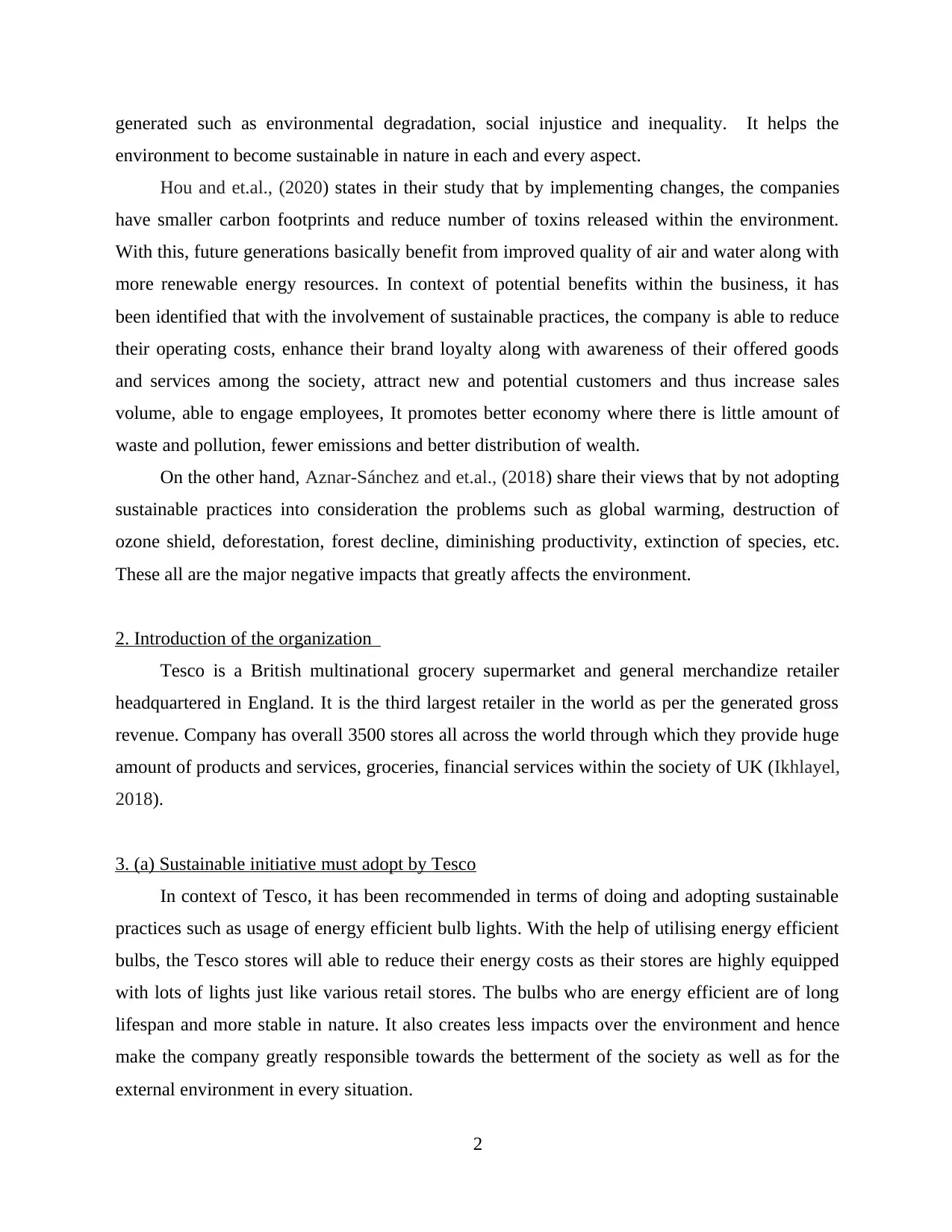
generated such as environmental degradation, social injustice and inequality. It helps the
environment to become sustainable in nature in each and every aspect.
Hou and et.al., (2020) states in their study that by implementing changes, the companies
have smaller carbon footprints and reduce number of toxins released within the environment.
With this, future generations basically benefit from improved quality of air and water along with
more renewable energy resources. In context of potential benefits within the business, it has
been identified that with the involvement of sustainable practices, the company is able to reduce
their operating costs, enhance their brand loyalty along with awareness of their offered goods
and services among the society, attract new and potential customers and thus increase sales
volume, able to engage employees, It promotes better economy where there is little amount of
waste and pollution, fewer emissions and better distribution of wealth.
On the other hand, Aznar-Sánchez and et.al., (2018) share their views that by not adopting
sustainable practices into consideration the problems such as global warming, destruction of
ozone shield, deforestation, forest decline, diminishing productivity, extinction of species, etc.
These all are the major negative impacts that greatly affects the environment.
2. Introduction of the organization
Tesco is a British multinational grocery supermarket and general merchandize retailer
headquartered in England. It is the third largest retailer in the world as per the generated gross
revenue. Company has overall 3500 stores all across the world through which they provide huge
amount of products and services, groceries, financial services within the society of UK (Ikhlayel,
2018).
3. (a) Sustainable initiative must adopt by Tesco
In context of Tesco, it has been recommended in terms of doing and adopting sustainable
practices such as usage of energy efficient bulb lights. With the help of utilising energy efficient
bulbs, the Tesco stores will able to reduce their energy costs as their stores are highly equipped
with lots of lights just like various retail stores. The bulbs who are energy efficient are of long
lifespan and more stable in nature. It also creates less impacts over the environment and hence
make the company greatly responsible towards the betterment of the society as well as for the
external environment in every situation.
2
environment to become sustainable in nature in each and every aspect.
Hou and et.al., (2020) states in their study that by implementing changes, the companies
have smaller carbon footprints and reduce number of toxins released within the environment.
With this, future generations basically benefit from improved quality of air and water along with
more renewable energy resources. In context of potential benefits within the business, it has
been identified that with the involvement of sustainable practices, the company is able to reduce
their operating costs, enhance their brand loyalty along with awareness of their offered goods
and services among the society, attract new and potential customers and thus increase sales
volume, able to engage employees, It promotes better economy where there is little amount of
waste and pollution, fewer emissions and better distribution of wealth.
On the other hand, Aznar-Sánchez and et.al., (2018) share their views that by not adopting
sustainable practices into consideration the problems such as global warming, destruction of
ozone shield, deforestation, forest decline, diminishing productivity, extinction of species, etc.
These all are the major negative impacts that greatly affects the environment.
2. Introduction of the organization
Tesco is a British multinational grocery supermarket and general merchandize retailer
headquartered in England. It is the third largest retailer in the world as per the generated gross
revenue. Company has overall 3500 stores all across the world through which they provide huge
amount of products and services, groceries, financial services within the society of UK (Ikhlayel,
2018).
3. (a) Sustainable initiative must adopt by Tesco
In context of Tesco, it has been recommended in terms of doing and adopting sustainable
practices such as usage of energy efficient bulb lights. With the help of utilising energy efficient
bulbs, the Tesco stores will able to reduce their energy costs as their stores are highly equipped
with lots of lights just like various retail stores. The bulbs who are energy efficient are of long
lifespan and more stable in nature. It also creates less impacts over the environment and hence
make the company greatly responsible towards the betterment of the society as well as for the
external environment in every situation.
2
Secure Best Marks with AI Grader
Need help grading? Try our AI Grader for instant feedback on your assignments.
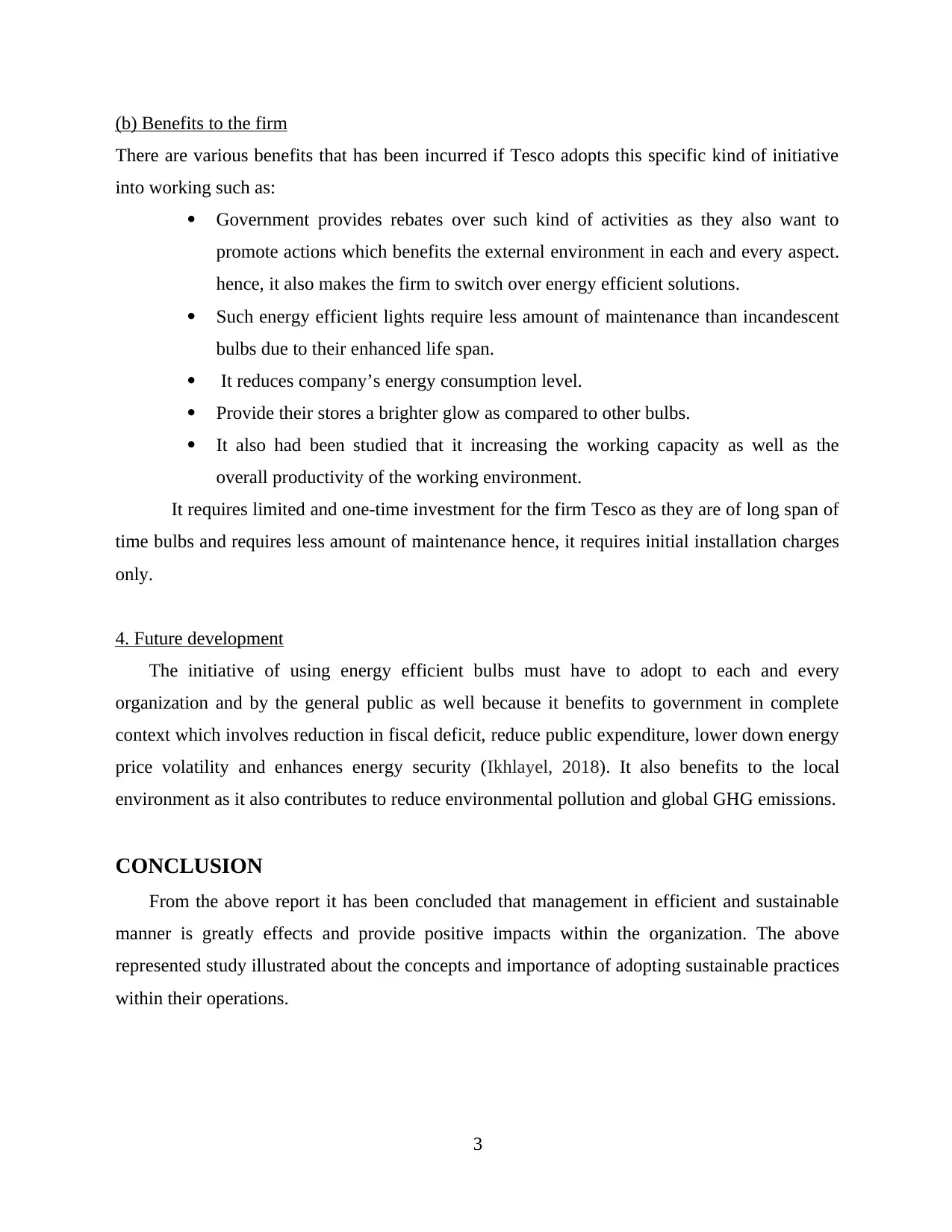
(b) Benefits to the firm
There are various benefits that has been incurred if Tesco adopts this specific kind of initiative
into working such as:
Government provides rebates over such kind of activities as they also want to
promote actions which benefits the external environment in each and every aspect.
hence, it also makes the firm to switch over energy efficient solutions.
Such energy efficient lights require less amount of maintenance than incandescent
bulbs due to their enhanced life span.
It reduces company’s energy consumption level.
Provide their stores a brighter glow as compared to other bulbs.
It also had been studied that it increasing the working capacity as well as the
overall productivity of the working environment.
It requires limited and one-time investment for the firm Tesco as they are of long span of
time bulbs and requires less amount of maintenance hence, it requires initial installation charges
only.
4. Future development
The initiative of using energy efficient bulbs must have to adopt to each and every
organization and by the general public as well because it benefits to government in complete
context which involves reduction in fiscal deficit, reduce public expenditure, lower down energy
price volatility and enhances energy security (Ikhlayel, 2018). It also benefits to the local
environment as it also contributes to reduce environmental pollution and global GHG emissions.
CONCLUSION
From the above report it has been concluded that management in efficient and sustainable
manner is greatly effects and provide positive impacts within the organization. The above
represented study illustrated about the concepts and importance of adopting sustainable practices
within their operations.
3
There are various benefits that has been incurred if Tesco adopts this specific kind of initiative
into working such as:
Government provides rebates over such kind of activities as they also want to
promote actions which benefits the external environment in each and every aspect.
hence, it also makes the firm to switch over energy efficient solutions.
Such energy efficient lights require less amount of maintenance than incandescent
bulbs due to their enhanced life span.
It reduces company’s energy consumption level.
Provide their stores a brighter glow as compared to other bulbs.
It also had been studied that it increasing the working capacity as well as the
overall productivity of the working environment.
It requires limited and one-time investment for the firm Tesco as they are of long span of
time bulbs and requires less amount of maintenance hence, it requires initial installation charges
only.
4. Future development
The initiative of using energy efficient bulbs must have to adopt to each and every
organization and by the general public as well because it benefits to government in complete
context which involves reduction in fiscal deficit, reduce public expenditure, lower down energy
price volatility and enhances energy security (Ikhlayel, 2018). It also benefits to the local
environment as it also contributes to reduce environmental pollution and global GHG emissions.
CONCLUSION
From the above report it has been concluded that management in efficient and sustainable
manner is greatly effects and provide positive impacts within the organization. The above
represented study illustrated about the concepts and importance of adopting sustainable practices
within their operations.
3
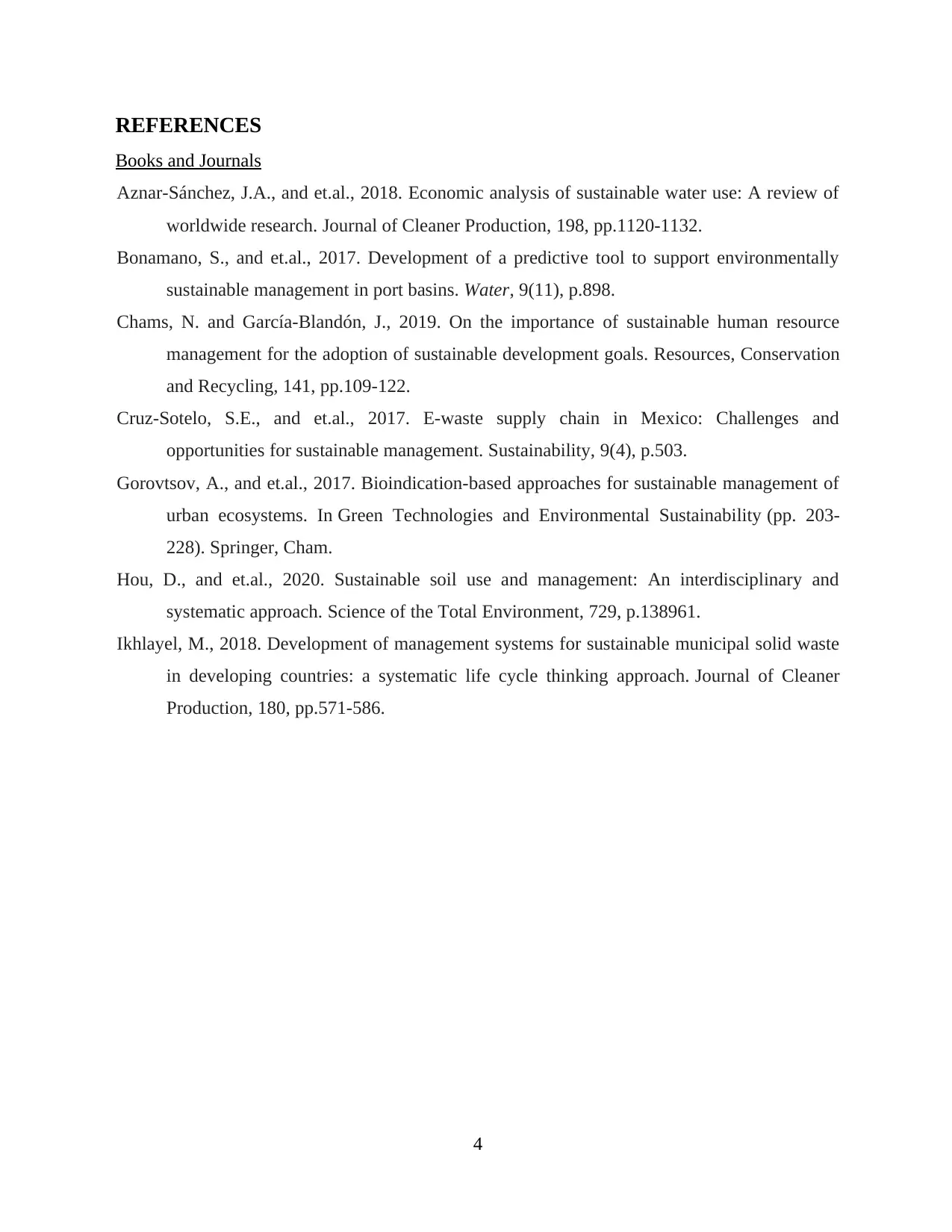
REFERENCES
Books and Journals
Aznar-Sánchez, J.A., and et.al., 2018. Economic analysis of sustainable water use: A review of
worldwide research. Journal of Cleaner Production, 198, pp.1120-1132.
Bonamano, S., and et.al., 2017. Development of a predictive tool to support environmentally
sustainable management in port basins. Water, 9(11), p.898.
Chams, N. and García-Blandón, J., 2019. On the importance of sustainable human resource
management for the adoption of sustainable development goals. Resources, Conservation
and Recycling, 141, pp.109-122.
Cruz-Sotelo, S.E., and et.al., 2017. E-waste supply chain in Mexico: Challenges and
opportunities for sustainable management. Sustainability, 9(4), p.503.
Gorovtsov, A., and et.al., 2017. Bioindication-based approaches for sustainable management of
urban ecosystems. In Green Technologies and Environmental Sustainability (pp. 203-
228). Springer, Cham.
Hou, D., and et.al., 2020. Sustainable soil use and management: An interdisciplinary and
systematic approach. Science of the Total Environment, 729, p.138961.
Ikhlayel, M., 2018. Development of management systems for sustainable municipal solid waste
in developing countries: a systematic life cycle thinking approach. Journal of Cleaner
Production, 180, pp.571-586.
4
Books and Journals
Aznar-Sánchez, J.A., and et.al., 2018. Economic analysis of sustainable water use: A review of
worldwide research. Journal of Cleaner Production, 198, pp.1120-1132.
Bonamano, S., and et.al., 2017. Development of a predictive tool to support environmentally
sustainable management in port basins. Water, 9(11), p.898.
Chams, N. and García-Blandón, J., 2019. On the importance of sustainable human resource
management for the adoption of sustainable development goals. Resources, Conservation
and Recycling, 141, pp.109-122.
Cruz-Sotelo, S.E., and et.al., 2017. E-waste supply chain in Mexico: Challenges and
opportunities for sustainable management. Sustainability, 9(4), p.503.
Gorovtsov, A., and et.al., 2017. Bioindication-based approaches for sustainable management of
urban ecosystems. In Green Technologies and Environmental Sustainability (pp. 203-
228). Springer, Cham.
Hou, D., and et.al., 2020. Sustainable soil use and management: An interdisciplinary and
systematic approach. Science of the Total Environment, 729, p.138961.
Ikhlayel, M., 2018. Development of management systems for sustainable municipal solid waste
in developing countries: a systematic life cycle thinking approach. Journal of Cleaner
Production, 180, pp.571-586.
4
1 out of 6
Related Documents
Your All-in-One AI-Powered Toolkit for Academic Success.
+13062052269
info@desklib.com
Available 24*7 on WhatsApp / Email
![[object Object]](/_next/static/media/star-bottom.7253800d.svg)
Unlock your academic potential
© 2024 | Zucol Services PVT LTD | All rights reserved.



